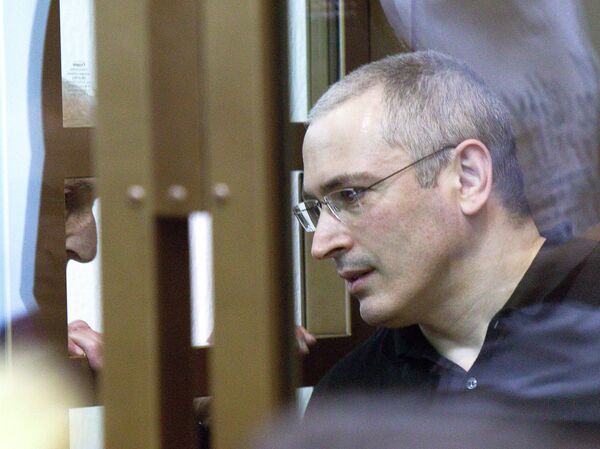MOSCOW, October 25 (Prime/RIA Novosti) – When Mikhail Khodorkovsky was arrested on this day in 2003, it was widely assumed he was paying the price for confronting the Kremlin.
The blundering opposition’s fate has waxed and waned while he’s been serving his lengthy Siberian prison sentence for a range of financial misdemeanors, but the legacy of his now effectively defunct Yukos oil giant remains to this day.
Yukos’ demise was a key point in the subsequent development of the Russian oil and gas industry.
High-profile international projects Yukos was developing have since been implemented – either by the Russian government or by “strategically significant” state oil and gas holdings, such as Rosneft.
Yukos was in Khodorkovsky’s heyday hailed as one of Russia’s few success stories.
From 1996 to 2003, it paid off its $3 billion of debt, slashed costs and doubled production.
By summer 2003, however, senior company figures stood accused of crimes ranging from fraud to contract killings, putting the company’s future in doubt.
Khodorkovsky’s arrest on October 25, 2003, was dramatic, although widely expected.
When his plane landed in Siberia, two vans full of armed men were waiting for him. They stormed his jet and took him into custody.
The government’s position is that he was prosecuted for economic crimes, including embezzlement and tax evasion.
His supporters argue that whatever the legal hook he was caught on, he was targeted for expressly political reasons – namely, funding opposition parties.
These two narratives have remained largely unchanged over the 10 years since his initial arrest. The latter has often been seen in the Western press and is accepted in government circles in both the United States and United Kingdom.
The legal process continued after the initial sentence was passed. There were appeals, new and modified charges, additional sentences and more appeals.
Khodorkovsky, whose jail term is set to end in August 2014, has for the past decade been the country’s most visible prisoner.
With op-eds and interviews appearing in glossy magazines, he remains a prominent public figure.
He had argued that the Russian oil and gas industry needed to consolidate if it was ever to be profitable.
On this, if little else, it seems the Kremlin policymakers agreed with him.
Russia’s oil sector spent the next 10 years consolidating, and the dismemberment of Yukos that followed his arrest became a key part in this process.
One main beneficiary has been Rosneft.
In 2003, it was merely one of many minnows in a crowded sector. Today it is a state-owned oil giant headed by Igor Sechin, long described in the inner circles of power as the gatekeeper to President Vladimir Putin.
In 2004, it was Rosneft that purchased a controlling share in one of Russia’s largest oil producers – Yuganskneftegaz – turning Rosneft into the country’s second largest oil and gas producer.
When more Yukos assets – Samaraneftegaz, the East Siberian Oil and Gas Company and Tomskneft – were auctioned off in bankruptcy proceedings in 2007, Rosneft snaffled the shares.
The deal boosted Rosneft’s oil production capacity by 15 million tons annually. The company also acquired oil processing facilities, enabling it to expand its gas station network more than twofold.
Rosneft funded these purchases through a $22 billion loan it paid off in 2008 – one year after it became Russia’s leading hydrocarbon producer.
In 2003, under Khodorkovsky,Yukos was in talks with US oil major ExxonMobil about strategic cooperation and was working on the idea of building a pipeline to resource-hungry neighbor China.
The collaboration with ExxonMobil went ahead. A joint venture to develop fields in the West Siberian shelf was set up in 2012 under the stewardship of Russia’s new, seemingly unassailable, oil giant Rosneft.
The idea of developing a pipeline to China also went ahead – under Transneft.
Many have noted that Rosneft’s rise in the early 2000s was largely based on Yukos’ demise. Russian experts also ask, if Khodorkovsky had sealed the deal with ExxonMobil, then maybe the fate of these two Russian oil companies would have been very different.




